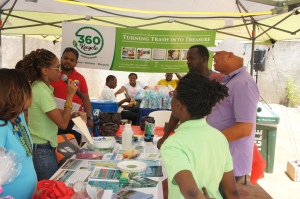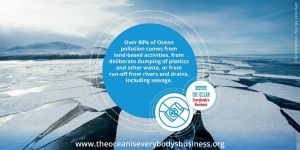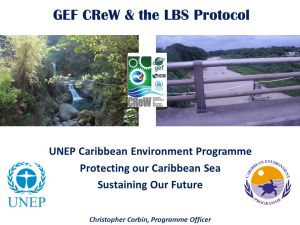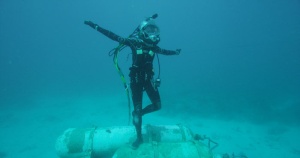The Ocean Conference at the UN in New York from June 5 – 9 included a Call to Action. Under the heading Our Ocean, Our Future it is really worthwhile reading the Annex at this link. This provides an overview of the incredible value to humankind of the ocean, which supplies nearly half of the oxygen we breathe and absorbs over one quarter of the carbon dioxide we produce. It’s a relationship of “give and take” between humans and the sea. Yet, who is now taking more than giving?

Here in the Caribbean, there is a major focus on marine pollution, and with good reason. The Caribbean Sea is besieged by untreated wastewater, chemical pollution from agriculture, plastics and micro plastics, solid waste of all kinds, pollution from ships and fishing… We are using our sea as a garbage dump, expecting it to somehow miraculously absorb and cleanse all the rubbish that we put into it. But, as we say in Jamaica: “Nutten nuh guh so.” Things don’t actually work that way.
Footnote: There is apparently some debate about whether we should use the word “Ocean” in the singular or the plural “Oceans” when describing the waters that cover three quarters of the globe. For now, it’s World Oceans Day on June 8. But, aren’t all our oceans connected? Take a look at the map of the world, and see what you think.
So here is a press release from the Kingston-based UN Environment Caribbean Environment Programme (UN-CEP), which last week focused on – yes, all that garbage in whatever form it takes; most of it coming from the land into the sea.
UN Environment-Caribbean: A Call to Action for a Pollution Free Caribbean Sea
Protecting our environment, and in particular the ocean, took centre stage this past week as millions of persons globally celebrated World Environment Day and World Oceans Day on June 5th and 8th respectively. International Conferences in New York and Costa Rica, held to coincide with these commemorative days, encouraged high level political commitment and partnerships.
Coordinator of the United Nations (UN) Environment Caribbean Environment Programme (CEP) based in Kingston, Jamaica Dr. Lorna Inniss, who attended both conferences, felt that “For Wider Caribbean Governments to continue to benefit sustainably from our coastal and marine resources and to develop new marine-based economic opportunities, UN agencies need to work more closely together with governments, donors, Civil Society and the private sector to ensure win-win opportunities for both the environment and our economies.”

Such collaboration was evident in Jamaica where the UN Environment CEP office and the Caribbean Sub-Regional Office (CSRO) hosted a series of awareness-raising activities for World Environment Day and World Oceans Day.
UN Environment showcased successes, challenges and opportunities through social media, radio, television and public events to help persons “connect with nature” – the theme for World Environment Day. These included:
Invitations to the public to share pledges on how they can protect the environment;
Videos on the importance of the ocean by students from the Hydel Preparatory and High Schools, St Andrew High School for Girls, and staff of the Oracabessa Bay Fish Sanctuary;
Photo competitions on the environment and the reuse of wastewater;
Airing of environmental videos on national television stations;
Interviews with UN Environment staff on national and regional radio stations on the importance of environmental protection.
Mr. Christopher Corbin, Pollution and Communications Officer for the UN-CEP, who coordinated activities in Jamaica stated: “I am extremely pleased and encouraged by the level of support we received from the public and in particular the private sector for our awareness raising efforts. The recognition, by everyone who took part, of the need to improve, for example, our waste management practices and to consider alternatives to single-use plastics, indicated that environmental awareness is growing and this must now be supported by practical solutions to the many challenges being faced.”

The highlight event organized by UN Environment was a Be Plastic Aware Shopping Challenge, focusing on reducing plastic pollution in Jamaica. Through a partnership with several private sector and non-governmental organisations, the Challenge helped raise consumer awareness on the importance of managing the use and disposal of plastics. General Foods Supermarket, Wisynco Group Limited, Recycling Partners of Jamaica, 360 Recycle Manufacturing Limited, Island Grill, Digicel, National Bakery, United Nations Population Fund (UNFPA) Sub-Regional Office for the Caribbean and the Canadian High Commission all partnered to support the event.
While continuing to ensure greater awareness of environmental issues by the general public, UN Environment, through its two offices in Jamaica is also working to implement national and community-based solutions.
The Caribbean Sub-Regional Office (CSRO) is working with the Government of Jamaica to develop a Plastic Waste Management Initiative, which is to be launched in July 2017. Mr Vincent Sweeney, Head of the UN Environment CSRO remarked that “this Initiative aims to not only raise awareness on the negative impacts of improper plastic disposal, but encourage business opportunities for the recycling of plastics on a larger scale within the country and to help to promote policies that improve the management of plastics, including collection and incentives for plastic waste disposal.”
The second initiative coordinated by UN Environment Caribbean Environment Programme is a Trash Free Partnership involving the United States Environmental Protection Agency (EPA), U.S. Peace Corps, and the Governments of Panama and Jamaica. This will promote community-based approaches for reducing garbage, raising awareness of the negative impacts of solid waste, plastics and marine litter and most importantly identifying and implementing practical and sustainable solutions for solid waste management.
Countries like Jamaica, which recently signed on to the Land Based Sources of Marine Pollution Protocol, for which the UN Environment Caribbean Environment Programme is the Secretariat, are now challenged to redouble their efforts to better manage all sources of pollution entering the Caribbean Sea; and to ensure that it remains in the future for persons who live and depend on what it provides to all of us.
About UN Environment’s Caribbean Environment Programme (CEP):
The Caribbean Environment Programme promotes regional co-operation for the protection and sustainable development of the marine environment of the 38 Member States and Territories of the Wider Caribbean Region. Established in 1981, it formed the basis for the development and adoption of the Cartagena Convention and its Protocols on Oil Spills, Marine Biodiversity (Specially Protected Areas and Wildlife – SPAW) and Pollution (Land Based Sources of Marine Pollution – LBS).
To find out more about the UN Environment-Caribbean Environment Programme, the Cartagena Convention and its Oil Spills, Marine Biodiversity and Pollution Agreements, please visit http://www.cep.unep.org.
You may contact Mr. Christopher Corbin, Pollution and Communications Programme Officer at UN Environment by telephone: 1 (876) 922-9267-9, Fax:1 (876)922-9292, Email: Christopher.Corbin@unenvironment.org for more information.
We can also be found on through social media:
Facebook: https://www.facebook.com/UNEP-Caribbean-Environment-Programme on Twitter @UNEP_CEP ; on Instagram; and onYouTube: https://www.youtube.com/user/CEPUNEP/featured

About World Oceans Day
Coordinated and promoted internationally by The Ocean Project since 2002, World Oceans Day is an annual celebration on June 8 as well as a call for ocean conservation action throughout the year.
This unique celebration of our world ocean brings together organizations and key individuals from aquariums, museums, youth groups, schools and universities, businesses, and others, including divers, surfers, sailors, communities of faith, artists, the maritime, recreational and tourism industries, governments, and more.
For more information visit: http://www.worldoceansday.org



Thanks for dropping by Rolling Harbour! Enjoyed this post. We have a huge beach pollution problem on Abaco from the Ocean. Or even ‘Oceans’! RH
LikeLike
Yes – I just saw this on Twitter and will be sharing widely. Where is the pollution coming from? I will have to read more about it on your blog. I wish you all the very best!
LikeLike
I have personally witnessed the massive amounts of plastics 2/3rd bottles that have been accepted readily by the Jamaican businesses. A 24Oz Coke or Pepsi product cost @ $0.30 cents USD. That same product costs @$2.00 USD
In 1984 on the very peacefull 7 Mile beach in Negril there were ladies sitting with coolers in front of the mostly Jamaican owned properties with ice from blocks of ice dropped off each morning to keep the GLASS BOTTLES OF THE TOP BEST SELLERS OF SODA POP AND RED STRIPE BEER. THOSE GLASS BOTTLES WERE RECYCLED BECAUSE THEY GOT A FEW CENT EACH FOR THEM. THEY ALSO HAD HEATED TABLE TOP OVENS WITH PATTIES AND BUNS AND THEY ALSO HAD GOOD CHEESE TO PUT ON THOSE BUNS. THE PATTIES WERE MADE BY THE OWNER OF EACH SEPARATE HOUSING RENTALS. THEY WERE NOT SOAKED IN GREASE LIKE THEY ARE FROM “JUICY PATTY ”
THEY PUT THEM IN A SMALL BROWN BAG AND THE GREASE WOULD SATURATE THE BAG. IN THE EARLY MORNING LADIES WOULD SQUEEZE FRESH SWEET ORANGES AND PUT THE JUICE IN CLEAN EMPTY LIQUOR BOTTLES. THAT WAS A OTHER RECYCLED PRODUCT. THE JUICE WAS SO DELICIOUS AND HOW I WAITED FOR OUR FIRST GULP ON THAT FIRST MORNING OF OUR DAY EACH YEAR LOOKING FORWARD TO DISCOVERING SOMETHING NÉW ON ” THE ROCK ” . I OFTEN TRIED TO EXPLAIN TO JAMAICAN FRIENDS THAT THE UNITED STATES WAS NOT A DREAM PLACE TO GO AND THEIR EXPECTATIONS WOULD BE SADLY REDUCED BY THE STRUGGLE TO FIND A JOB IN MANY PLACES A RACIST SOCIETY. IT ALWAYS HURT ME TO WATCH HOW TOURISTS WOULD FREQUENTLY BE CONDISENDING MAKING JOKES THAT WERE HARDLY A JOKE AT ALL.
THE BLACK PLASTIC ( SCANDAL BAG ) IS USED OVER AND OVER AGAIN UNTIL IT DISINTGRATES. IT KEEPS WHAT A PERSON IS CARRYING A SECRET. IT NEEDS TO BE A SECRET BECAUSE OF JEALOUSY ON WHAT MAY HAVE BEEN GIVEN TO THEM BY A FOREIGN FRIEND POSSIBLY FOR THEIR CHILDREN OR A NEED THAT THEY CAN NOT GET IN JAMAICA. THIS IS ALL VERY COMPLICATED BUT YES THEY NEED TO CLEAN UP THE ROADSIDE THEIR SMALL COMMUNITIES, AROUND SCHOOLS AND SHOPS OF WHICH THERE ARE THOUNDS. THE REEFS THAT ARE CLOSE TO SHORE ARE BASICALLY BEYOND BRINGING BACK BUT ALMOST ANYTHING IS POSSIBLE. EVERY STARFISH AND CONCH ARE GONE IN CLOSE TO THE SHORELINE. IN DEEPER WATER CORAL REEF ALL THE SEA FANS ARE GONE BECAUSE THE JAMAICANS TRIED TO SELL THEM IN WOODEN STANDS ALONG THE ROAD. THE HARSH SUN BEATING DOWN ON THEM DESTROYED THEM. STILL ANOTHER GREAT LOSS IS THE MAGNIFICENT EXOTIC TREES HAVE ALMOST ALL BEEN CUT DOWN AND BOUGHT LARGELY BY JAPAN. THE BANANA CROP IS NO LONGER IN A PRODUCE EXPORT DUE TO HURRICANES ABOUT TEN YEARS AGO AND REESTABLISHING BANANA’S AS AN EXPORT IS NOT FEASIBLE DUE TO THE NUMBER OF PLANTS NECESSARY. EACH BANANA PLANT/TREE ONLY PRODUCES ONE ” STALK ” . ON THAT STALK THERE ARE OVER A DOZEN HANDS. MANY CARIBEEN ISLANDS AND AT LEAST 2/3 OF THE LAND MASS OF OUR PLANET ARE IN CRISIS. THE WORD THEY ARE USING IS EXTINCTION OF OUR PLANET!!!🌎🌎🌎🌎🌎🌎🌎🌎
LikeLike
You are absolutely right, Linda. This is indeed a complicated issue, and there are many factors to be taken into consideration. Thank you for your comments!
LikeLike